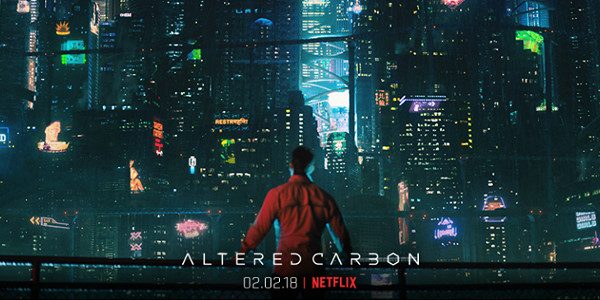‘Altered Carbon’ Looks Too Long Into the Abyss
Let me begin by saying: Altered Carbon is magnificent!
The story is beautifully melancholy, but for all its darkness, not without hope. It is well-told and gorgeously photographed. The visuals are stunning. The music and sound design are on-point. The characters are fully actualized in their backstories and personalities, and are wonderfully realized by the actors who play them. Allow me a bit of cliche superfluity as I say that Altered Carbon is an artistic television triumph.
So, what’s the problem?
Well, not to be generalized as a conservative prude, the problem, or the question, really, is, “what’s with all the nudity?” Indeed, one cannot look in any meaningful way at the story, the construction of the show, or its messaging without talking about the nudity.
Look, I get it: the show is about, at least in some sense, the body. It asks of the audience, what happens when our lives, lived inside these shells of ours, transcend what we know of as mortality? What happens when we can shed our flesh like a snake sheds its skin? How far can we go before we lose our souls?
To that end, the viewer is practically assaulted with nudity–but not just any nudity. The men are handsome; the women beautiful. We are treated to the visual pleasures of a world in which people are given the ability to be, or have, anything they want. It is sexual exploitation extrapolated to its logical, if far-fetched, conclusion.
Or at least, on the surface that conclusion is far-fetched. It seems to me that one of the messages of the nudity prevalent throughout Altered Carbon is that, perhaps, this exploitative attitude we revile in the Upper Class living in their high rises above the clouds isn’t actually all that far off from where we are now. It invites us to enjoy the view, and then uses that enjoyment to drive home the point that we’re already driving off the cliff, and didn’t even know it.

It’s clever, really, but given so many of the other themes present in the series, also a touch ironic. Perhaps even hypocritical (though, as with the nudity, I suppose one could be pedantic enough to suggest that even the hypocrisy is itself part of the point).
Let’s pause here for a minute, and talk about the multi-faceted moral of this story. The thematic elements of Altered Carbon seem to be one part Prometheus, three parts Nietzsche. It’s a lesson in what happens when we fly too close to the sun. It also packs the wallop of “God Is Dead,” and the one-two punch of Nietzche’s second most famous quote: “Beware that, when fighting monsters, you yourself do not become a monster… for when you gaze long into the abyss. The abyss gazes also into you.”
The villains of the piece, at least the three main villains, are really the tragic heroes of their own stories. The husband and wife who wanted to truly be together forever, but who, in one character’s words, “ruined each other.” Who wanted to become gods, but became demons. The loving sister whose passion and dependency twisted until she became the very evil that brought her and her brother so close to begin with.
“Beware that, when fighting monsters, you yourself do not become a monster.” This is the lesson of Reileen’s story. Be watchful that you do not become that which you wish to destroy. To really drive the point home, the series even presents to us a virus which causes people to do exactly that. “The enemy was us,” says one such character, before succumbing to her wounds. Indeed, if one had to choose, from among the several themes present in the series, it is this one and, let’s face it, it ain’t subtle.
Perhaps this is why the filmmakers’ choice to expose exploitation by becoming exploiters themselves is so… disappointing. Certainly, theirs is a minor exploitation when compared to the blood- and sex-fueled indulgence of the central villains… but it is exploitation, all the same.
The point is well-made. We are becoming commodities, and we are losing our ability to feel. Gratuitous sex and violence is cauterizing an important part of who we are as a people–that place in our souls where we keep our empathy and compassion. We are losing our ability to be shocked as media and current events up the ante more and more each passing year.
Yet, with enough nudity to callous all but the most hormonal of prepubescent boys, and scene after scene of pummelling, brutal ultraviolence, one must wonder whether Altered Carbon is a part of the problem. If, perhaps, in exposing the sins of a world that more and more commonly sees others as disposable, as existing merely for its own pleasure, the series merely succeeds in adding another such sin to the world’s grievous catalogue.
And that’s too bad, really, but it does nicely illustrate the point: Stare too long into the abyss, and it looks back.
Beware, Storyteller, that when fighting monsters, you yourself do not become one.








































Wait, is that the one where main character guy is named Takeshi and is stuck into a white-guy body? And everyone mispronounces his name, even his sister, who comments about getting him out of a “gaijin” body while slightly mispronouncing the word “gaijin”? (It broke my irony meter, is what I’m saying.)
And it was really uncomfortable to watch the differences between how the character was presented between the white-guy body and the Asian-guy body. Like the white guy was deeply cynical and the Asian guy slanted towards spiritual-Zen-sensei and I’m all like, this feels racist. Like, did they not think that the main character would be sympathetic or relatable while being deeply cynical and almost cruel while in an Asian body?
Honestly, as an exploration between the difference between body and mind, I like the book “Ancillary Justice” by Ann Leckie (and its sequels) better. Also I can guarantee way less graphic nudity.
If that is the one, I watched it a few months ago and you can see the kind of lasting impact it had on me, where I can’t even remember the name.
When a show does certain things–regular exposure of human nudity among them–I won’t watch. It doesn’t matter if it’s otherwise good in terms of its writing.
This stems from me simply being honest about myself and my own capacity to participate in evil.
It’s a shame though that really thought-provoling series are often the ones leading the charge off the edge into a moral abyss…